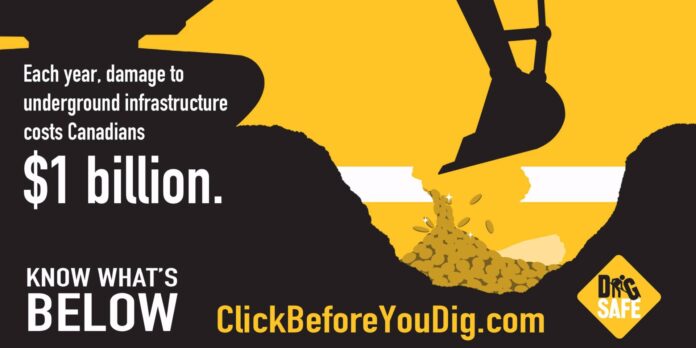Getting companies that have not signed on to Sask1stCall or Utility Safety Partners in Alberta is one of the challenges facing industry as it tries to reduce the over $1 billion a year in costs that arise when underground infrastructure gets disrupted.
Both organizations help homeowners and industry gain insight into buried infrastructure before excavation takes place.
In some cases, maps may be old, or pipelines abandoned, and crews need to have some idea of the lay of the land before shovels hit the ground, followed by the hissing sound of a busted gas line, which puts lives and the entire project at risk.
“There are certain parameters that need to be respected. It’s a dangerous business and you hope you never have a line strike,” says Lloydminster mayor, Gerald Aalbers.
His comments come as industry partners met in Lloydminster for the annual Dig Safe Breakfast hosted by Saskatchewan Common Ground Alliance (SCGA), and industry partners like Astec Safety.
While safety advocates encourage industry to join groups like Sask1stCall or Utility Safety Partners so that infrastructure can be collated before a project begins, the issue of a provincial or federal mandate is another avenue being explored.
“This is a provincial item. As a municipal leader, I would encourage any company to make sure that they are registered and talk to their upper management,” says Aalbers, noting that the legislation “would likely come sooner rather than later, and I hope it’s not at the end of somebody’s life.”
Lisa Kosolofski, director with Sask1stCall, underscored the safety aspect to ensure that everyone gets home safely.
“When it comes down to it, getting that locate done, clicking before you dig, knowing what’s below, and understanding that the buried infrastructure now is getting so complex,” says Kosolofski.
On the issue of getting companies to sign up, Mike Sullivan with Utility Safety Partners in Alberta shares that mandating this through legislation is a “multi-faceted sword.”
“Bringing people there willingly is the best way, but will legislation come one day – perhaps,” says Sullivan.
In Saskatchewan, Kosolofski says they have the highest number of homeowners who put in requests before they dig. But more industries need to subscribe to the Sask1stCall service, which can be accessed online or by phone.
“When it comes to subscribing, we don’t want to drag them across the bridge. We want them to come join the party and just see that this is where it’s at. We are really working on creating business cases as to why this is a good choice,” says Kosolofski as she points to the damages and cost to people, repairing infrastructure, and the delays that arise when a pipeline or fibre optic cable is cut.
“The actual dollars and cents – it makes sense to really subscribe,” adds Kosolofski, noting that onboarding new subscribers or industry partners is the priority.
In Canada, the Common Ground Alliance estimates there is about $1 billion in damages to buried utilities every year.
April is Dig Safe Month. The breakfast information session at the Lloyd Ex wrapped with well wishes for a safe digging season.
The activities this month will conclude on April 28, the Day of Mourning to remember people who have died on the job.
More information on submitting requests in Alberta or Saskatchewan can be found using the links in this story.



